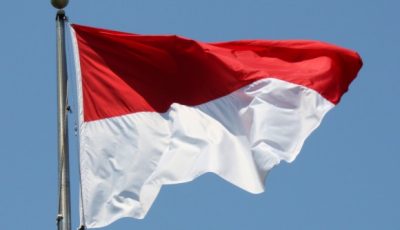Washington Seeks to Overturn Indonesia’s Traditionally Non-aligned Position

All Global Research articles can be read in 51 languages by activating the Translate Website button below the author’s name (only available in desktop version).
To receive Global Research’s Daily Newsletter (selected articles), click here.
Click the share button above to email/forward this article to your friends and colleagues. Follow us on Instagram and Twitter and subscribe to our Telegram Channel. Feel free to repost and share widely Global Research articles.
Spread the Truth, Refer a Friend to Global Research
***
Indonesia’s traditional foreign policy is a careful balance between the United States and China, one that Washington seeks to unsettle without respecting the Southeast Asian country’s historical non-alignment stance. Indonesia aims to uphold its strategic independence while promoting regional stability and prosperity, but this is also being challenged by Washington’s growing militancy against China in the Asia-Pacific region.
Despite China and the US accusing each other of military maneuvers that fuel tensions in the Asia-Pacific region, Indonesia holds major military exercises with the US but maintains China as its main economic partner. This is in the hope of offsetting the risk of pivoting too much towards one great power, especially as both desperately vie for influence in a country with three major maritime chokepoints — the Malacca, Lombok, and Sumba Straits.
The 2023 Super Garuda Shield exercise involved 1,900 Indonesian military personnel, 2,100 from the US, and 1,000 more from Australia, Japan, and Singapore, and “strengthens the US-Indonesian bilateral relationship,” according to US Maj. General Jered P. Helwig. This was the largest such exercise involving Indonesian and US troops.
Although the US will once again participate in the 2024 Super Garuda Shield, Indonesian military spokesman Major General Nugraha Gumilar stressed that the exercise has no intention of consolidating military power against certain countries and reaffirmed that Indonesia is a non-aligned country in terms of regional security, adding that there is defence cooperation with China in military education and officer’s student exchange.
“We have Chinese military officers joining the Indonesian military’s Staff and Command School and the Indonesian Army’s Staff and Command School,” he said.
At the same time, a 2017 United States National Defense University assessment found that Indonesia was among China’s top ten military diplomatic partners from 2003 to 2016.
Decisionmakers in Jakarta have successfully maintained a balanced policy, but Washington is actively challenging this. Washington seeks to exploit differences Southeast Asian countries have with each other and China because of territorial disputes over the South China Sea and leverages this to turn countries against Beijing.
One example is Indonesian Trade Minister Zulifi Hasan’s announcement in June of the introduction of import duties on Chinese goods to mitigate the effects of the US-China trade war.
“The United States wants to impose a 200% tariff on imported ceramics or clothing. We can also do this to ensure that our small businesses and industries survive and thrive,” the minister said.
Washington’s trade war has led to an oversupply of goods in China’s domestic markets, forcing the redirection of commodity flows to other foreign markets, particularly Indonesia, which threatens Indonesian producers. Recall that in May 2024, the trade confrontation between the US and China reached a new level after US President Joe Biden introduced protective tariffs on a wide range of Chinese goods, which has clearly hurt Indonesia despite its balanced policies.
Yet, even manipulative tactics like this to unsettle Jakarta-Beijing relations cannot work. Indonesia’s president-elect Prabowo Subianto, who will take office on October 20, travelled to Beijing on April 1 at the invitation of Chinese President Xi Jinping, just some weeks after securing the presidency, signaling his intent to continue Indonesia’s cooperation with China.
Continued cooperation with Beijing will be lucrative and beneficial for Indonesia, which already has 71 China-funded projects underway, the same number of projects as Pakistan and second only to Cambodia’s 82. Indonesia–China trade reached over $149 billion in 2022, a 19.8% increase year-on-year, and China’s $8.2 billion was the second-largest source of investment in Indonesia. China pledged an additional $44.89 billion to Indonesia in July 2023 and a further $21.7 billion two months later.
In this way, although the US is seemingly a more important military partner for Indonesia than China, the country’s main trading partner is clearly China. Nonetheless, the US has caused minor damage in Indonesia-China ties through its trade war, but this is only a hiccup in the grander scheme of trade relations and investments, which are only set to increase year on year.
Given that Donald Trump is expected to enter the White House in January 2025, tensions between Washington and Beijing will heighten further than what Biden took it, and Indonesia, as a country that sees a huge portion of world trade passing through its waters, will become a key battleground for influence. However, it is likely that the status quo in Jakarta-Washington and Jakarta-Beijing ties will continue when Subianto becomes president later this year since he has given no indication of moving away from Indonesia’s traditionally non-aligned position.
*
Note to readers: Please click the share button above. Follow us on Instagram and Twitter and subscribe to our Telegram Channel. Feel free to repost and share widely Global Research articles.
This article was originally published on InfoBrics.
Ahmed Adel is a Cairo-based geopolitics and political economy researcher. He is a regular contributor to Global Research.

